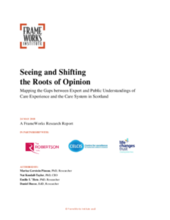This report presents findings from a project sponsored by and conducted in close partnership with The Robertson Trust, Life Changes Trust and CELCIS (Centre for Excellence for Looked After Children in Scotland). It charts public understandings of childhood, parenting and the care system, and examines how these ways of thinking complicate, and occasionally facilitate, communicating about care issues. The authors identify strategies that the sector can use to build support for the changes necessary to improve the lives of care-experienced children and young people.
Communicating effectively about care experience and the care system in Scotland first requires a clear sense of the core ideas the sector wants to communicate. The report begins with a distillation of these points into an ‘untranslated story’ of care experience and the care system in Scotland.
These ideas represent the content that needs to be communicated to the public through a framing strategy.
After summarising these key ideas, the report describes the deep, highly shared but largely unconscious patterns of thinking – what anthropologists call cultural models – that inform how members of the Scottish public understand care experience and think about the care system. Working from over 1,000 pages of interview transcripts, we identify the powerful and predictable ways that people think about children, family, parenting and care, and how they draw on these understandings to make sense of the care system and those who experience it. Some of these ways of thinking are productive – they open people up to the ideas the sector is seeking to communicate. Others lead in less productive directions, reinforcing stereotypes about individuals with care experience and perpetuating negative ideas of the system itself.
Understanding why people think the way that they do about care experience allows us to develop framing strategies with the power to change public discourse and thinking about these issues. Shifting this discourse and expanding thinking are precursors to creating public will and generating demand for the programmes and policies that will ultimately improve the way we care for, support and protect young people in Scotland. A description of the research methods used and demographic information about the interview sample can be found in the Appendix.

